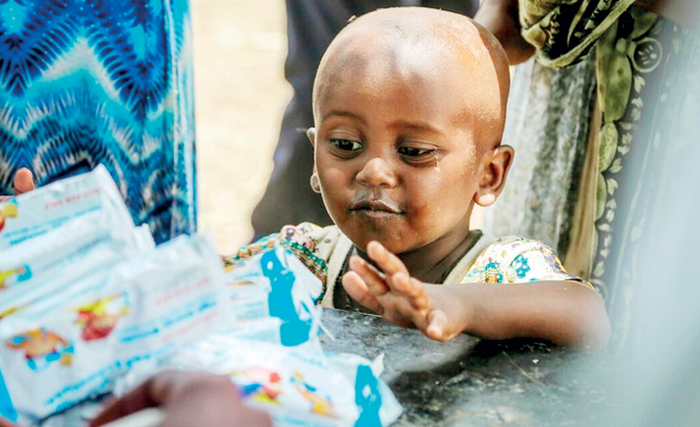News
UN warns 345 million people face starvation worldwide

The United Nations food chief has warned the world is facing “a global emergency of unprecedented magnitude” with up to 345 million people marching towards starvation – and 70 million pushed closer to starvation by the war in Ukraine.David Beasley, Executive Director of the UN World Food Programme, told the UN Security Council on Thursday the 345 million people facing acute food insecurity in the 82 countries where the agency operates is more than twice the number of acutely food insecure people before the COVID-19 pandemic hit in 2020.
He said it is incredibly troubling that 50 million of those people in 45 countries are suffering from very acute malnutrition and are “knocking on famine’s door”.
“What was a wave of hunger is now a tsunami of hunger,” he said, pointing to rising conflict, the pandemic’s economic ripple effects, climate change, rising fuel prices and Russia’s invasion of Ukraine.
Since Russia invaded its neighbour on February 24, Beasley said, soaring food, fuel and fertiliser costs have driven 70 million people closer to starvation.Despite an agreement in July, allowing Ukrainian grain to be shipped from three Black Sea ports, blockaded by Russia, and continuing efforts to get Russian fertiliser back to global markets, “there is a real and dangerous risk of multiple famines this year”, he said.
“And in 2023, the current food price crisis could develop into a food availability crisis if we don’t act.”
‘All hands on deck’
The Security Council was focusing on conflict-induced food insecurity and the risk of famine in Ethiopia, northeastern Nigeria, South Sudan and Yemen. But Beasley and UN humanitarian chief Martin Griffiths also warned about the food crisis in Somalia, which they both recently visited, and Griffiths also put Afghanistan high on the list.
“Famine will happen in Somalia. Be sure it won’t be the only place either,” Griffiths said.
He cited recent assessments that identified “hundreds of thousands of people facing catastrophic levels of hunger” – meaning they are at the worst famine level.
Beasley recalled his warning to the council in April 2020 “that we were then facing famine, starvation of biblical proportions”. He said then the world “stepped up with funding and tremendous response, and we averted catastrophe”.
“We are on the edge once again, even worse, and we must do all that we can – all hands on deck with every fibre of our bodies,” he said. “The hungry people of the world are counting on us and … we must not let them down.”
Effects of conflict and violence
Griffiths said the widespread and increasing food insecurity is a result of the direct and indirect effect of conflict and violence that kills and injures civilians, forces families to flee the land they depend on for income and food, and leads to economic decline and rising prices for food they cannot afford.After more than seven years of war In Yemen, he said, “some 19 million people – six out of 10 – are acutely food insecure, an estimated 160,000 people are facing catastrophe, and 538,000 children are severely malnourished”.
Beasley said the Ukraine war is stoking inflation in Yemen, which is 90 percent reliant on food imports. The World Food Programme hopes to provide aid to about 18 million people, but its costs have risen 30 percent this year to $2.6bn.As a result, it has been forced to cut back so Yemenis this month are getting only two-thirds of their previous rations, he said.
Beasley said South Sudan faces “its highest rate of acute hunger since its independence in 2011” from Sudan. He said 7.7 million people, more than 60 percent of the population, are “facing critical or worse levels of food insecurity”.
Without a political solution to escalating violence and substantial spending on aid, “many people in South Sudan will die”, he warned.‘Exhausted families over the edge’ In northern Ethiopia’s Tigray, Afar and Amhara regions, more than 13 million people need life-saving food, Griffiths said. He pointed to a survey in Tigray in June that found 89 percent of people food insecure, “more than half of them severely so”.
Beasley said a truce in March enabled WFP and its partners to reach almost five million people in the Tigray area, but resumed fighting in recent weeks “threatens to push many hungry, exhausted families over the edge”.
In northeast Nigeria, the UN projects that 4.1 million people are facing high levels of food insecurity, including 588,000 who faced emergency levels between June and August, Griffiths said. Almost half of those people could not be reached because of insecurity, and the UN fears “some people may already be at the level of catastrophe and already dying”.
Griffiths urged the Security Council to “leave no stone unturned” in trying to end these conflicts, and to step up financing for humanitarian operations, saying UN appeals in those four countries are all “well below half of the required funding”. – Al Jazeera
Latest News
Action beyond dialogue is essential in addressing Green Financing and climate change. – Prime Minister

There have been numerous discussions and dialogues successfully conducted across various sectors, but it is now crucial to move beyond conversation and focus on strengthening the implementation. Such collaborative effort like GGGI initiates in leading Sri Lanka towards a resilient and sustainable finance.
The Prime Minister made these remarks while attending the Sri Lanka climate finance awareness session on advancing sustainable finance and carbon markets for climate action held today (30) at hotel Marriott Bonvoy in Colombo City Center.
The awareness session was organized by the Prime Minister’s Office with the collaboration of the ministry of Environment and Global Green Growth Institute (GGGI) to create awareness of Green finance strategies leading to new initiatives for sustainable Sri Lanka.
Delivering the keynote address, Prime Minister Dr. Harini Amarasuriya stated that this session is intended to support the line ministries in better understanding how these financing mechanisms work and how they could be leveraged to implement the sustainable development priorities.
Addressing the event, the Prime Minister further stated:
“Sri Lanka has developed and updated numerous environmental frameworks to address the growing challenge of climate change, that has become the current development challenge that continues to affect lives, livelihoods, and our overall trajectory as a nation.
In Sri Lanka, key sectors such as agriculture, fisheries, energy, tourism, and water are increasingly exposed to climate-related disruptions, threatening both livelihoods and macroeconomic stability. To prevent this trajectory, we must leverage a full spectrum of international climate finance instruments.
Sri Lanka has a solid policy foundation, political will, and the institutional capacity to lead on climate action. What we now need is the financial architecture to match this ambition. Hence, today’s session represents a step toward building shared awareness and technical capacity across the public sector”.
The Prime Minister emphasized that while numerous discussions and dialogues have been successfully conducted across various sectors, it is now crucial to move beyond conversation and focus on concrete implementation highlighting that meaningful results can only be achieved when ideas and plans are translated into action, and urged all stakeholders and officers to prioritize execution to bring about the positive changes the country needs.
The event was attended by secretary to the Prime Minister, G. P. Saputhanthri, representatives from the central bank, representatives of Ministries and GGGI institute.
[Prime Minister’s Media Division]
News
Pirivena and Bhikkhu education must be developed – PM

Prime Minister Dr. Harini Amarasuriya stated that there is a contemporary need to develop the Pirivena and Bhikkhu education and that the government is seeking the revered guidance of Maha Sangha in that cause.
The Prime Minister made these remarks while addressing the 125th anniversary celebrations of the Amarapura Ariyavansa Saddhamma Yukthika Nikaya on Tuesday (29) at the Sri Subodhi Rajarama Mulasthana Maha Vihara in Bombuwala, Kalutara.
During the event, the Prime Minister honored sixty-three venerable members of the Maha Sangha who had rendered their noble service to the Sasana and also conferred awards upon several distinguished lay benefactors in recognition of their contributions.
Delivering the keynote speech, the Prime Minister stated:
“There has always been a strong bond between Buddhism and society throughout history. Culture and social relations have been built alongside the Buddhist philosophy. The society we seek to establish as a nation must embody the Buddhist values of fairness, equality, and compassion. These virtues, as taught in the Buddhist philosophy, are ever relevant and alive.
Piriven and Bhikkhu education are currently facing numerous challenges, and considerable efforts are needed to address them. Thereby a substantial and concerted intervention is required.
A pertinent question arises as whether our Pirivena institutions are adequately preparing for the evolving needs of the world? There was once a belief in Europe that, with scientific advancement, religion would become redundant. Today, this view has been discredited. Along with material progress, spiritual development remains indispensable.
The knowledge, attitudes, and skills of our Bhikkhus must be enhanced to meet the emerging global challenges. A profound discussion on necessary reforms in Piriven and Bhikkhu education is therefore imperative.
Opportunities for Bhikkhus to study subjects such as mathematics, science, and modern languages are currently limited. Without exposure to contemporary disciplines, it is questionable whether one can successfully confront present-day challenges”.
The event, held under the patronage of the Venerable Egodamulle Amaramoli Mahanayake Thera, the Chief incumbent of the Amarapura Ariyavansa Saddhamma Yukthika Nikaya, was attended by members of the Maha Sangha, Minister of Mass Media and Health Mr. Nalinda Jayatissa, several Members of Parliament, and numerous lay devotees.

[Prime Minister’s Media Division]
Latest News
1,000-acre forest plantation project to be launched under “Clean Sri Lanka” programme

Under the “Clean Sri Lanka” programme, plans are underway to launch a 1,000-acre forest plantation project in collaboration with the private sector. This large-scale initiative is designed to operate under the Public-Private-People Partnership (4P) concept and a preliminary discussion on the project was held today (30) at the Presidential Secretariat.
The discussion focused on resolving technical aspects associated with the project and addressing the fundamental issues necessary for the land release.
The programme aims to implement several effective environmental projects in the coming year with the active participation of the private sector. These efforts are intended to safeguard the country’s biodiversity, forest cover and natural ecosystems, while also reinforcing the shared responsibility of the public, government and private sector in environmental conservation.
The discussion was chaired by Senior Additional Secretary to the President Russell Aponsu and Additional Secretary of the Clean Sri Lanka Programme S.P.C. Sugeeshwara, with the participation of senior officials from the Ministries of Agriculture, Livestock, Lands and Irrigation and Environment
-

 Business4 days ago
Business4 days agoPick My Pet wins Best Pet Boarding and Grooming Facilitator award
-

 News4 days ago
News4 days agoNew Lankan HC to Australia assumes duties
-

 News4 days ago
News4 days agoLankan ‘snow-white’ monkeys become a magnet for tourists
-

 News2 days ago
News2 days agoJapan-funded anti-corruption project launched again
-

 Features4 days ago
Features4 days agoKing Donald and the executive presidency
-

 Business4 days ago
Business4 days agoACHE Honoured as best institute for American-standard education
-

 Features6 days ago
Features6 days agoThe Truth will set us free – I
-

 Business2 days ago
Business2 days agoNational Savings Bank appoints Ajith Akmeemana,Chief Financial Officer












